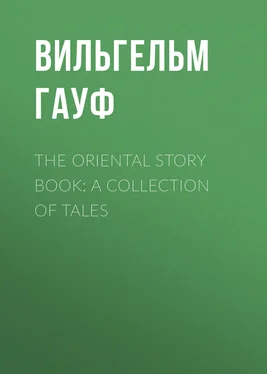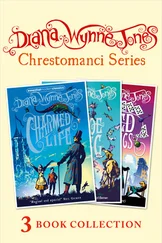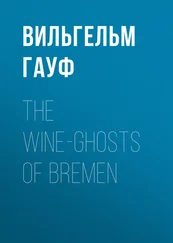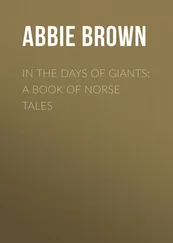Вильгельм Гауф - The Oriental Story Book - A Collection of Tales
Здесь есть возможность читать онлайн «Вильгельм Гауф - The Oriental Story Book - A Collection of Tales» — ознакомительный отрывок электронной книги совершенно бесплатно, а после прочтения отрывка купить полную версию. В некоторых случаях можно слушать аудио, скачать через торрент в формате fb2 и присутствует краткое содержание. Жанр: Сказка, foreign_antique, foreign_prose, foreign_children, на английском языке. Описание произведения, (предисловие) а так же отзывы посетителей доступны на портале библиотеки ЛибКат.
- Название:The Oriental Story Book: A Collection of Tales
- Автор:
- Жанр:
- Год:неизвестен
- ISBN:нет данных
- Рейтинг книги:4 / 5. Голосов: 1
-
Избранное:Добавить в избранное
- Отзывы:
-
Ваша оценка:
- 80
- 1
- 2
- 3
- 4
- 5
The Oriental Story Book: A Collection of Tales: краткое содержание, описание и аннотация
Предлагаем к чтению аннотацию, описание, краткое содержание или предисловие (зависит от того, что написал сам автор книги «The Oriental Story Book: A Collection of Tales»). Если вы не нашли необходимую информацию о книге — напишите в комментариях, мы постараемся отыскать её.
The Oriental Story Book: A Collection of Tales — читать онлайн ознакомительный отрывок
Ниже представлен текст книги, разбитый по страницам. Система сохранения места последней прочитанной страницы, позволяет с удобством читать онлайн бесплатно книгу «The Oriental Story Book: A Collection of Tales», без необходимости каждый раз заново искать на чём Вы остановились. Поставьте закладку, и сможете в любой момент перейти на страницу, на которой закончили чтение.
Интервал:
Закладка:
“Good-morning, Madam Long-legs; already, so early, upon the pond?”
“Fine thanks, beloved Clatter-beak. I have brought me a little breakfast. Would you like, perhaps, the quarter of an eider-duck, or a little frog’s thigh?”
“My best thanks, but this morning I have little appetite. I come to the pond for a very different reason. I have to dance to-day before the guests of my father, and I wish to practise a little in private.”
Immediately, thereupon, the young lady-stork stepped, in great excitement, over the plain. The Caliph and Mansor looked on her in amazement. When, however, she stood in a picturesque attitude upon one foot, and, at the same time, gracefully moved her wings like a fan, the two could contain themselves no longer; a loud laugh broke forth from their bills. The Caliph was the first to recover himself. “That were once a joke,” said he, “which gold could not have purchased. Pity! that the stupid birds should have been driven away by our laughter; otherwise they would certainly even yet have been singing.”
But already it occurred to the Grand-Vizier that, during their metamorphosis, laughter was prohibited; he shared his anxiety on this head with the Caliph. “By Mecca and Medina! that were a sorry jest, if I am to remain a stork. Bethink thyself, then, of the foolish word, for I can recall it not.”
“Three times must we bow ourselves to the East, and at the same time say, Mu—mu—mu—”
They turned to the East, and bowed so low that their beaks almost touched the earth. But, O misery! that magic word had escaped them; and though the Caliph prostrated himself again and again, though at the same time the Vizier earnestly cried “Mu—mu—,” all recollection thereof had vanished, and poor Chasid and his Vizier were to remain storks.
CHAPTER III
THE enchanted ones wandered sorrowfully through the fields, not knowing, in their calamity, what they should first set about. To the city they could not return, for the purpose of discovering themselves, for who would have believed a stork that he was the Caliph? or, if he should find credit, would the inhabitants of Bagdad have been willing to have such a bird for their master? Thus, for several days, did they wander around, supporting themselves on the produce of the fields, which, however, on account of their long bills, they could not readily pick up. For eider-ducks and frogs they had no appetite, for they feared with such dainty morsels to ruin their stomachs. In this pitiable situation their only consolation was that they could fly, and accordingly they often winged their way to the roofs of Bagdad, to see what was going on therein.
On the first day they observed great commotion and mourning in the streets; but on the fourth after their transformation, they lighted by chance upon the royal palace, from which they saw, in the street beneath, a splendid procession. Drums and fifes sounded; on a richly-caparisoned steed was seated a man, in a scarlet mantle embroidered with gold, surrounded by gorgeously-attired attendants. Half Bagdad was running after him, crying, “Hail, Mizra! Lord of Bagdad!” All this the two storks beheld from the roof of the palace, and the Caliph Chasid exclaimed,—
“Perceivest thou now why I am enchanted, Grand-Vizier? This Mizra is the son of my deadly enemy, the mighty sorcerer Kaschnur, who, in an evil hour, vowed revenge against me. Still I do not abandon all hope. Come with me, thou faithful companion of my misery; we will go to the grave of the Prophet; perhaps in that holy spot the charm may be dissolved.” They raised themselves from the roof of the palace, and flew in the direction of Medina.
In the use of their wings, however, they experienced some difficulty, for the two storks had, as yet, but little practice. “O Sire!” groaned out the Vizier, after a couple of hours; “with your permission, I can hold out no longer; you fly so rapidly! Besides, it is already evening, and we would do well to seek a shelter for the night.”
Chasid gave ear to the request of his attendant, and thereupon saw, in the vale beneath, a ruin which appeared to promise safe lodgings; and thither, accordingly, they flew. The place where they had alighted for the night, seemed formerly to have been a castle. Gorgeous columns projected from under the rubbish, and several chambers, which were still in a state of tolerable preservation, testified to the former magnificence of the mansion. Chasid and his companion went around through the corridor, to seek for themselves a dry resting-place; suddenly the stork Mansor paused. “Lord and master,” he whispered softly, “were it not foolish for a Grand-Vizier, still more for a stork, to be alarmed at spectres, my mind is very uncomfortable; for here, close at hand, sighs and groans are very plainly perceptible.” The Caliph now in turn stood still, and quite distinctly heard a low moaning, which seemed to belong rather to a human being than a beast. Full of expectation, he essayed to proceed to the place whence the plaintive sounds issued: but the Vizier, seizing him by the wing with his beak, entreated him fervently not to plunge them in new and unknown dangers. In vain! the Caliph, to whom a valiant heart beat beneath his stork-wing, burst away with the loss of a feather, and hastened into a gloomy gallery. In a moment he reached a door, which seemed only on the latch, and out of which he heard distinct sighs, accompanied by a low moaning. He pushed the door open with his bill, but stood, chained by amazement, upon the threshold. In the ruinous apartment, which was now but dimly lighted through a grated window, he saw a huge screech-owl sitting on the floor. Big tears rolled down from her large round eyes, and with ardent voice she sent her cries forth from her crooked bill. As soon, however, as she espied the Caliph and his Vizier, who meanwhile had crept softly up behind, she raised a loud cry of joy. She neatly wiped away the tears with her brown-striped wing, and to the great astonishment of both, exclaimed, in good human Arabic,—
“Welcome to you, storks! you are to me a good omen of deliverance, for it was once prophesied to me that, through storks, a great piece of good fortune is to fall to my lot.”
When the Caliph recovered from his amazement, he bowed his long neck, brought his slender feet into an elegant position, and said: “Screech-owl, after your words, I venture to believe that I see in you a companion in misfortune. But, alas! this hope that through us thy deliverance will take place, is groundless. Thou wilt, thyself, realize our helplessness, when thou hearest our history.”
The Screech-owl entreated him to impart it to her, and the Caliph, raising himself up, related what we already know.
CHAPTER IV
WHEN the Caliph had told his history to the owl, she thanked him, and said: “Listen to my story, also, and hear how I am no less unfortunate than thyself. My father is the king of India; I, his only, unfortunate daughter, am called Lusa. That same sorcerer Kaschnur, who transformed you, has plunged me also in this affliction. He came, one day, to my father, and asked me in marriage for his son Mizra. My father, however, who is a passionate man, cast him down the steps. The wretch managed to creep up to me again under another form, and as I was on one occasion taking the fresh air in my garden, clad as a slave, he presented me a potion which changed me into this detestable figure. He brought me hither, swooning through fear, and exclaimed in my ear with awful voice, ‘There shalt thou remain, frightful one, despised even by beasts, until thy death, or till one, of his own free will, even under this execrable form, take thee to wife. Thus revenge I myself upon thee, and thy haughty father!’
“Since then, many months have elapsed; alone and mournfully I live, like a hermit, in these walls, abhorred by the world, an abomination even to brutes. Beautiful nature is shut out from me; for I am blind by day, and only when the moon sheds her wan light upon this ruin, falls the shrouding veil from mine eye.”
Читать дальшеИнтервал:
Закладка:
Похожие книги на «The Oriental Story Book: A Collection of Tales»
Представляем Вашему вниманию похожие книги на «The Oriental Story Book: A Collection of Tales» списком для выбора. Мы отобрали схожую по названию и смыслу литературу в надежде предоставить читателям больше вариантов отыскать новые, интересные, ещё непрочитанные произведения.
Обсуждение, отзывы о книге «The Oriental Story Book: A Collection of Tales» и просто собственные мнения читателей. Оставьте ваши комментарии, напишите, что Вы думаете о произведении, его смысле или главных героях. Укажите что конкретно понравилось, а что нет, и почему Вы так считаете.












